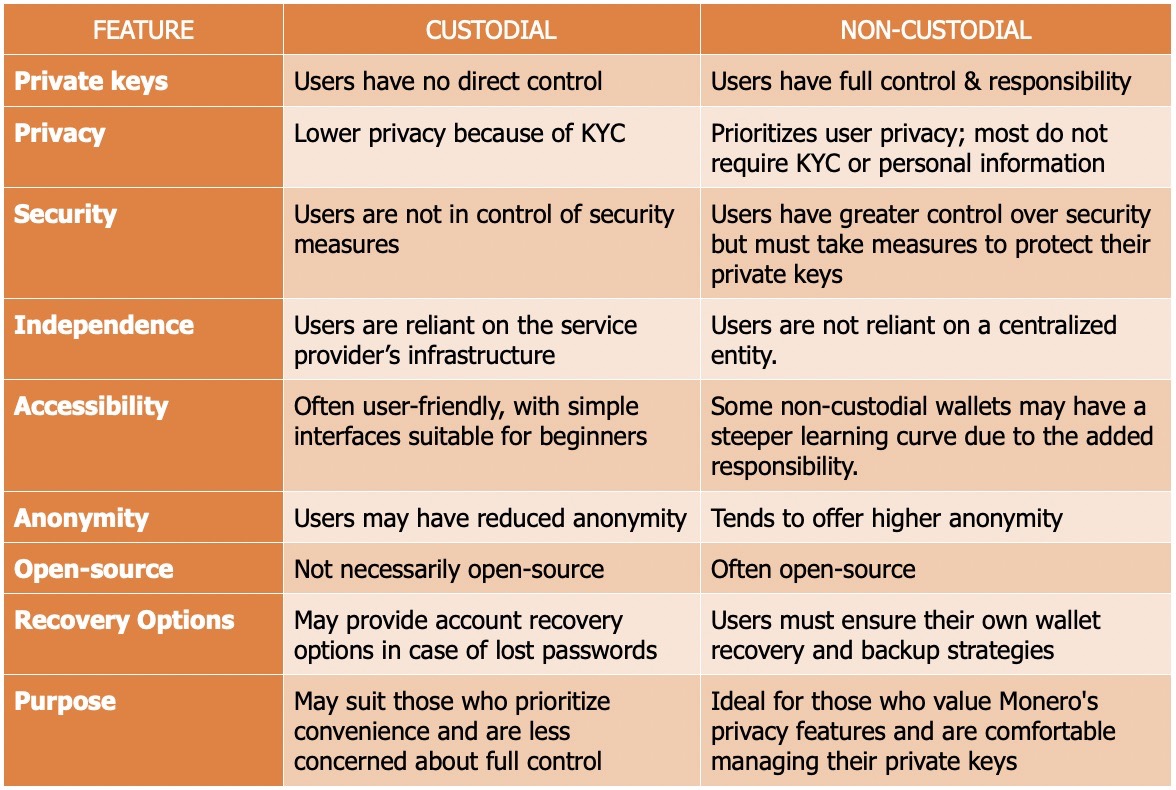
One name stands out among cryptocurrencies for its commitment to privacy and security: Monero. Monero or XMR is not just another digital currency but a movement towards preserving the core principles of blockchain technology: anonymity, fungibility, and decentralization. This focus on privacy makes Monero a favorite among those who value financial confidentiality and believe that what you do with your money is your business.
Whether you are a seasoned crypto user or just dipping your toes into the exciting world of digital assets, one question invariably arises: How do you securely store and manage your Monero holdings? This is where Monero wallets come into play, serving as the gatekeepers to your XMR treasure. Yet, not all Monero wallets are created equal, leading us to a vital fork in the road – the choice between non-custodial and custodial wallets.
Understanding Monero Wallets
A Monero wallet serves is a digital repository for your XMR holdings, much like the wallet you carry for traditional currency. It is where your private keys, the keys to your Monero kingdom, are securely stored.
This wallet is your portal to the Monero blockchain, where you can receive, store, send XMR, and monitor your transactions. However, unlike physical wallets, these digital guardians can take different forms, and this is where the distinction between non-custodial and custodial Monero wallets comes into play.
Custodial XMR Wallets
Custodial XMR wallets operate on the principle of custody. A third party, often a cryptocurrency exchange or a financial service provider, takes the responsibility of safeguarding your Monero holdings and managing your private keys.
Custodial XMR wallets offer users a convenient and user-friendly way to store and manage their Monero holdings. They involve transferring control of Monero assets and private keys to a trusted service provider. These wallets often come with recovery options to enhance user convenience. They are, however, inherently vulnerable to third-party risks. Security breaches or lapses by the service provider can jeopardize users' assets. Custodial wallets frequently require users to complete KYC procedures, compromising the privacy that Monero is designed to offer.
This option is suitable for individuals who prioritize ease of use and are willing to trust a third party but may not align with the core principles of Monero – privacy and decentralization.
Non-Custodial XMR Wallets
Non-custodial XMR wallets are self-contained, user-controlled applications designed to offer individuals full ownership and control of their Monero. Users have their private keys, which are stored directly on their device or in an encrypted format only they can access. These wallets prioritize user privacy and security, as they do not require users to share personal information or undergo KYC procedures.
Non-custodial wallets are decentralized and often open-source, allowing users to independently verify the code and maintain Monero's core principles of privacy. The increased security and privacy come at the cost of convenience, as users must take full responsibility for their private keys and wallet security. This option is ideal for those who value Monero's privacy and security features and are comfortable managing their private keys, accepting the added responsibility in exchange for full control over their assets.
This table illustrates comparisons between custodial and non-custodial XMR wallets, considering factors like, control, privacy, security, independence, accessibility, anonymity, open-source nature, recovery options, and suitability for different user preferences and priorities.

The choice between custodial and non-custodial options is a decision that ultimately rests on your priorities and preferences. Custodial wallets offer ease of use, making them suitable for beginners and those who value convenience. However, they come with the trade-off of reduced control and privacy. Non-custodial wallets, on the other hand, grant you full control and prioritize Monero's renowned privacy features. This option is ideal for those who want to embrace the core principles of cryptocurrencies, including self-sovereignty and anonymity.
Your choice should be guided by factors like your comfort level managing private keys, your commitment to Monero's privacy ethos, and your risk tolerance. Whether you lean toward custodial or non-custodial Monero wallets, the paramount goal is to engage with this powerful cryptocurrency in a way that aligns with your unique financial needs and aspirations.
